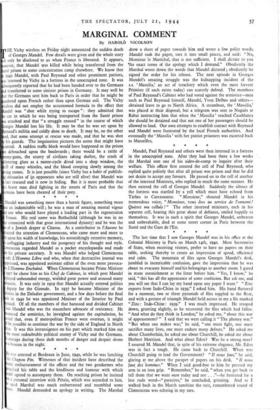Mandel was something more than a heroic figure, something more
an an indomitable will ; he was a man of amazing mental vigour d one who would have played a leading part in the regeneration France. His real name was Rothschild (although he was in no 11 connected with that great international dynasty) and he was the n of a Jewish draper at Chatou. As a contributor to l'Aurore he acted the attention of Clemenceau, who came more and more to v upon his width of knowledge, his astonishingly retentive memory, unflagging industry and the pungency of his thought and style. menceau regarded Mandel as a pocket encyclopaedia and made no his private secretary. It was Mandel who helped Clemenceau edit L'Homme Libre and who, when that destructive journal was ppressed, was appointed assistant editor of the even more provoca- L'Homme Enchain. When Clemenceau became Prime Minister t917 he chose him as his Chef de Cabinet, in which post Mandel played unbounded energy, wielded great power and aroused many busies. It was only in 1919 that Mandel actually entered politics deputy for the Gironde. In 1937 he became Minister of the onies in the Daladier government, and a few days before the final h in 1940 he was appointed Minister of the Interior by Paul nand. Of all the members of that harassed and divided Cabinet was Mandel who was the staunchest advocate of resistance. He flounced the armistice, he inveighed against the capitulation, he sted that, even if metropolitan France were overrun, it might II be possible to continue the war by the side of England in North ca. It was this intransigence on his part which marked him out the most redoubtable political enemy of Vichy and the Germans. courage during those dark months of danger and despair shone a beacon in the night.






















 Previous page
Previous page